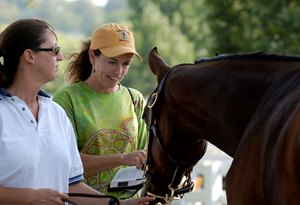De Meric to Offer Korean-Bred Colt at OBS Spring Sale


What started as a trip to the Republic of Korea for Jaqui de Meric to demonstrate evidence-based horsemanship, the training method used at de Meric Sales in Ocala, Fla., developed into a fruitful working relationship with Korean clients who have since shipped their young horses to be sold the United States.
Now, one of those colts is expected to go through the Ocala Breeders' Sales Spring 2-Year-Olds in Training Sale April 23-26.
"They wanted to try and demonstrate that a Korean-bred horse could compete with the American-bred horse," de Meric said of the clients.
Six colts bred by private clients were selected to ship to the de Merics' care and four were entered in the Spring Sale. Hip 23 by Ecton Park and Hips 427 and 911, both by Hansen, all breezed an eighth-mile in :10 1/5, but only the latter is expected to be offered when the bidding starts Tuesday. The colt was bred in Korea by Kim Kyung Tae and is out of the Korean-bred Concept Win mare Angel Star.
"They all performed very nicely," de Meric said. "They're good, strong, sound horses."
Invited almost six years ago to Korea, De Meric was recruited to demonstrate evidence-based horsemanship—which creates best practices based on empirical outcomes—to the Korea Racing Authority, whose mission is to improve the country's racing. De Meric brought her daughter, Ali, along as a rider. Showcasing before a crowd of what de Meric estimates was around 600-700 people at a KRA farm, the demonstration was a major success and de Meric has continued to make return trips to Korea to teach training methods.
In turn, she has hosted close to 20 people from Korea at De Meric Stables from one to three months at a time, taking the opportunity to learn more about their racing industry.
De Meric said you can feel the thirst for knowledge her Korean clients have for American horse racing. She complimented their feeding program, with many using Purina from the U.S. and ordering hay from Australia and New Zealand. Horses in Korea, de Meric said, may also receive ginseng or have their feed tub dressed with fresh alfalfa sprouts.
With the Korean government doing away with limitations that dictated what Korean buyers could previously spend on bloodstock from foreign countries, de Meric said Korea has taken full advantage, vastly improving their stallion prospects and purchasing high-quality broodmares for import.
One of the most obvious examples of this change being Hansen, a son of Tapit who was named 2011 champion 2-year-old male.
Located on JeJu Island, the KRA Stud Farm is both the home of Korean stallions and a training center. It is also the organization that purchased Knicks Go, the Claiborne Breeders' Futurity (G1) winner and Sentient Jet Breeders' Cup Juvenile (G1) runner-up, for $87,000 at the 2017 Keeneland September Yearling Sale. While he has remained in North America to race, the plan is to add the son of Paynter to Korea's breeding industry following his retirement from racing.
"They want to put their country forward and show they can compete with everybody else," de Meric said of the Korean racing industry. "What they remind me of is what racing in Japan was 20 years ago with their racing and breeding ... Now they're winning international major graded races with the Japanese-breds. They have some of the best bloodstock around from Europe and America and Australia.
"They really, truly love the horses. When I first went over, people got all upset when a horse sold to Korea. I didn't know what to expect," de Meric recalled. "Every farm and certainly every training center has a vet clinic on site. At Seoul Racecourse, there's two vet hospitals on the track right there on site."
She also noted multiple years of schooling are required to become a groom, rider, or trainer in Korea as in Japan.
"I try to tell people, 'When your horse is sold to Korea you should be really happy for them because they're going to have a good life,'" de Meric added. "They're well cared for."
